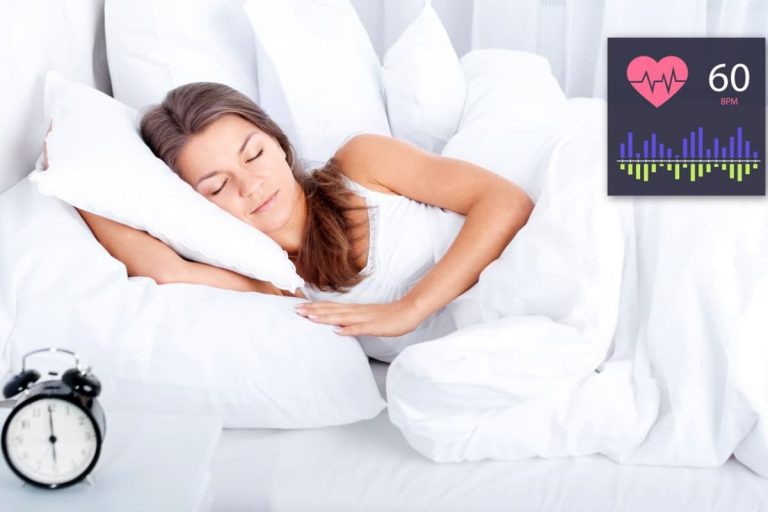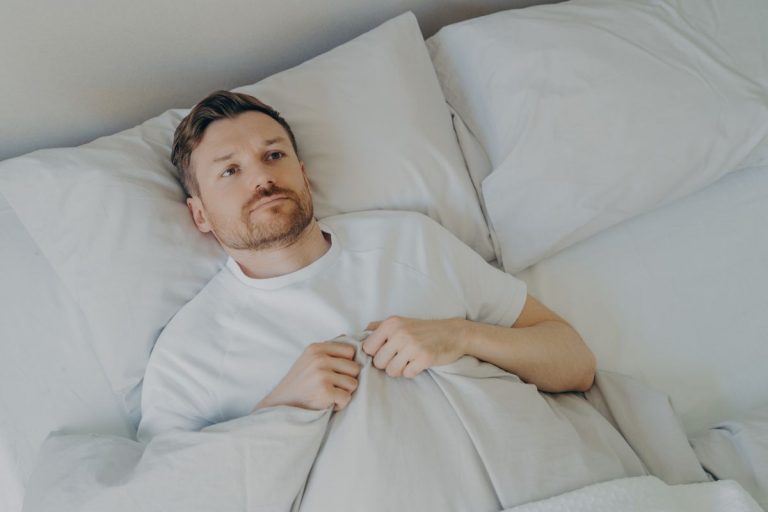Sleep is one of the most essential and involuntary functions that we cannot live without. It is an irreplaceable way in which the body restores, recovers and accumulates energy necessary for day-to-day functioning.
A lack of quality sleep can lead to numerous health issues, not to mention that it can affect one’s ability to think, understand, react, operate, etc. All of our bodily functions depend, directly or indirectly, on the amount of sleep we get, as well as its quality.
Therefore, many people tend to ask themselves how much deep sleep is actually enough to function normally.
For some people, only a few hours of sleep seem to work, while others can’t get enough and need to sleep even more than 7 or 8 hours.
The amount of sleep a person needs is completely individual; however, the amount of deep sleep is pretty standard. In the following paragraphs, we will discuss the amount of the deep sleep we need, as well as other, deep sleep-related topics.
Understanding Deep Sleep
In order to understand how much deep sleep is essential for proper functioning, it is also important to understand deep sleep as neurobiology and a system. Now, what is commonly known as deep sleep is actually the slow-wave sleep phase of our sleeping process.
Deep sleep consists of different stages of eye movement, known as rapid eye movement stages. During these stages, the body goes through the so-called relaxed wakefulness phase, high brain activity and finally the slow-wave sleep which is often associated with deep sleep.
Read More: Stages of Sleep: REM vs. Deep Sleep vs. Light Sleep
During deep sleep, our EEG activity is synchronized. This means that our neurons are silent, able to rest, the muscle movement is also moderate, and the general genital activity is also absent.
Deep sleep is basically a complete resting period for the whole body. During the deep sleep phase, the body ensures that the memory is processed, growth-hormone is produced, that the body is physically healing and repairing any kind of damage or health issue. So, the importance of deep sleep is undeniable.
The Necessary Amount of Deep Sleep
As mentioned before, the amount of sleep people need is completely individual. The recommended hours of sleep are usually between 6 and 8, depending on the individual’s lifestyle and habits. In those hours of sleep, deep sleep is bound to occur. Now, there is no way to determine or guarantee that deep sleep will occur; it very much depends on your general quality of sleep.
If there are any disturbances, you might actually skip the deep sleep phase and spend the whole night in relaxed wakefulness for example. So, to determine the number of deep sleep hours you need is hard.
So, let’s assume that you usually have a good quality sleep, lasting anywhere between 6 to 8 hours. This means that the amount of deep sleep you will experience, and usually need, can vary between 45 to 90 minutes.
This usually refers to the first phase of deep sleep. Some people experience several deep sleep phases during their sleep, but each new phase lasts a shorter amount of time.
So, generally, up to 90 minutes of deep sleep should be sufficient for a healthy grown-up who has a good-quality sleep. During this period, the body will be able to recuperate, relax and restore energy for the following day.
How Much of (Deep) Sleep do We Individually Need?
- Babies – studies have shown that babies need sleep, especially deep sleep, the most. A baby should spend at least 13 to 15 hours asleep every day.
At least 50% of those hours should be spent in slow-wave sleep, and 50% non-REM sleep. Babies require this much sleep for healthy growth (the growth hormone releases during deep sleep) and for general healthy development.
- Children – depending on their age, children should spend anywhere between 9 and 14 hours asleep every day. For example, toddlers need 11 to 14 hours asleep, preschoolers 11-13, school-aged children up to 12 and teenagers up to 10 hours asleep every day. Getting enough sleep will help children with successful learning, growth and general health.
- Adults – as mentioned before, healthy adults need anywhere between 6 and 8 hours of sleep every day for normal functionality. Some studies have shown that healthy adults should sleep between 7 and 9 hours every day.
This shows that the number of sleeping hours can vary from person to person, depending on their lifestyle, habits, and type of work. However, getting less than 6 and more than 9 hours of sleep can be counterproductive for adults and cause health issues.
- Older adults – it is well known that the older we get, the less sleep we need. That is why many older adults tend to get up to 6 hours of sleep per night. They usually don’t sleep very well, especially if they have health problems.
Therefore, it is excellent if older adults can get at least 45 to 90 minutes of a deep sleep, or go through one deep sleep phase. Moreover, older adults should try to sleep for at least 7 or 8 hours every day.
Deep Sleep in People Suffering Sleeping Problems and Possible Solutions
When you’re suffering from sleeping issues, like insomnia or interrupted sleep, getting enough of deep sleep hours seems almost impossible. People with serious sleeping difficulties usually develop numerous health issues, mostly because their body never enters the slow-wave sleep stage. Lack of deep sleep is often caused by weakened sleep drive, overworking, sleep disorders and substance use.
The solution to entering at least the first phase of deep sleep stage for people with sleeping issues can be the following;
- Extending wakefulness to increase sleepiness and deep sleep as well. Sleep restriction has shown to be effective in insomnia cases. Lack of sleep can actually initiate a period of sleeping, where a deep sleep phase can occur several times, lasting up to 90 minutes.
- Following the circadian pattern can enhance the occurrence of deep sleep. The circadian pattern regulates the sleep-wake cycle, and it refers to the internal clock all humans have. So, if you’re a morning person, make sure to go to bed early. Or if you’re a night owl, make sure to work in the morning. This way you will regulate your circadian pattern and ensure a good night’s sleep.
- Adjusting the sleeping environment can affect the amount of deep sleep you get, regardless of whether you have sleeping disorders or not. It is important not to watch TV before bedtime, or stare at your phone while you scroll endlessly through Facebook or Instagram. The temperature in your bedroom should be cooler, and the room overall should be quiet. Make sure to keep the room dark as well.
- Avoiding daytime napping can extend the amount of deep sleep you get. Napping during the day can decrease your need for sleep during the night. Moreover, it removes the sleep depth from your sleep cycle, which can affect the quality of your sleep quite significantly.
What is the Normal Sleeping Pattern?
Normal sleeping pattern includes two types of sleep, REM and non-REM sleep, which repeat every 90 to 100 minutes. REM (rapid eye movement) occurs during deep sleep and is usually characterized by eye movement while the eyelids are closed, and of course, by dreaming. During deep sleep is when we enter the dreaming-mode, and that is the only stage when we can dream.
During non-REM sleep (no rapid eye movement), the brain is generally less active (eye movement is absent), however, the body can move. There is muscle activity and the person in non-REM sleep can easily wake up.
The REM and non-REM sleep phases are intertwined in a normal sleeping pattern.
Of course, every person’s sleeping pattern changes as they grow older. However, as long as the REM sleep phase occupies at least 25% of one’s sleeping hours, the sleeping pattern is characterized as normal.
If the percentage drops, or even if it drastically increases, then the person is experiencing irregularities in their sleeping pattern and should consult a medical professional.
What Happens When Deep Sleep Doesn’t Occur?
When the slow-wave sleep phase doesn’t occur, the body goes through numerous changes, both physical and mental;
- Drowsiness, which can cause slow reaction time and potential accidents, injuries and overall harm to oneself or others. Lack of deep sleep can be extremely dangerous, especially for people operating heavy machinery or doing other, incredibly responsible jobs.
- Lack of deep sleep can cause a plethora of health problems, from heart attacks, high blood pressure, heart diseases, stroke, diabetes, etc. Not to mention the numerous sleep disorders it can commence; insomnia is one of the most common results of sleep deprivation.
- Lack of deep sleep can affect one’s mental health. It can cause depression, anxiety, paranoia and general ability to function mentally. It also kills one’s ability to feel affection, perceive things properly and it lowers one’s libido and sex drive.
- Deep sleep is responsible for memory processing. Therefore, lack of deep sleep can induce forgetfulness, and in the long run, even dementia. Moreover, lack of deep sleep can interfere with your ability to process new, learned information.
- Lack of deep sleep can make you look older, as it ages your skin rapidly. Chronic sleep deprivation leads to larger pores, wrinkles, darker and deeper eye circles, loss of collagen in the skin, etc. There is a reason the term ‘beauty sleep’ exists, and now we know why.
Reasons You’re Not Getting Enough Deep Sleep
Lack of sleep is actually a very common occurrence in the modern world. No matter how hard they try, some people simply never make it to the deep sleep stage. That is why many of us feel like zombies in the morning. Here are some of the most common causes of sleep deprivation;
- Eating before sleep – late night dinner, or snacks, can affect one’s ability to sleep significantly. Eating before sleeping can cause heartburn as well as the need to visit the bathroom several times, especially if you eat something very unhealthy.
So, if you’re really hungry before bedtime, make sure to eat a healthy snack, or try combating hunger with a cup of chamomile tea.
- Anxiety and overthinking – worrying and overthinking can interfere with sleep, and can cause even more anxiety and worry; it is a vicious cycle.
So, it is important to relax before going to sleep; try listening to some relaxing music, reading a book, or drinking a nice cup of tea. If you’re sleeping with your significant other, try to hug them or sleep close to them; this should reduce your stress and anxiety levels, enabling you to fall asleep.
- Too hot in the room – the temperature in your bedroom can affect your sleeping quality. The temperature must be a bit lower in the bedroom. Try using the thermostat to achieve the ideal temperature.
Or, you can try sleeping in loose clothing, and with fewer covers. Make sure to also ventilate the room before sleeping (open the window for a few minutes and let fresh, cooled air ventilate the room,or you can try some bed cooling system if you can afford them).
- Caffeine and alcohol – it is important you pay attention to the things you consume and drink before bedtime. Caffeine can increase your energy levels and boost your metabolism; none of which can help you with sleep.
Moreover, alcohol can interrupt your sleep and make you wake up several times throughout the night. Moreover, you won’t feel good in the morning as well.
Summary
Getting enough of (deep) sleep is a problem for many people. Chances are that you clicked on this article for the same reasons. However, finding a fix can be rather simple; there needs to be some changes in your lifestyle and general approach to sleeping.
You need to prioritize a good night’s sleep over your work (at home) or staying up late to party. Once in a while, surely, you can cut yourself some slack. But, if you suffer from a lack of sleep for a longer time, this can turn into a chronic problem. Therefore, make sure to follow some of our recommendations and advice, and you’ll be getting enough sleep in no time.





